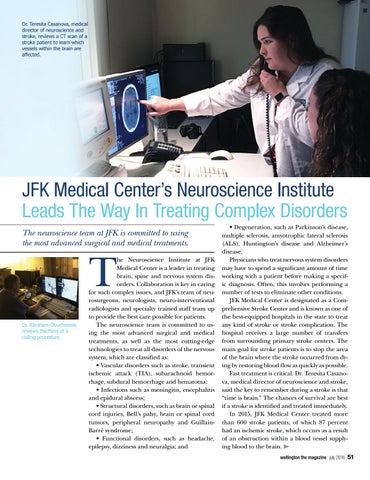Dr. Teresita Casanova, medical director of neuroscience and stroke, reviews a CT scan of a stroke patient to learn which vessels within the brain are affected.
JFK Medical Center’s Neuroscience Institute Leads The Way In Treating Complex Disorders The neuroscience team at JFK is committed to using the most advanced surgical and medical treatments.
T
Dr. Abraham Obuchowski reviews the films of a coiling procedure.
he Neuroscience Institute at JFK Medical Center is a leader in treating brain, spine and nervous system disorders. Collaboration is key in caring for such complex issues, and JFK’s team of neurosurgeons, neurologists, neuro-interventional radiologists and specialty trained staff team up to provide the best care possible for patients. The neuroscience team is committed to using the most advanced surgical and medical treatments, as well as the most cutting-edge technologies to treat all disorders of the nervous system, which are classified as: • Vascular disorders such as stroke, transient ischemic attack (TIA), subarachnoid hemorrhage, subdural hemorrhage and hematoma; • Infections such as meningitis, encephalitis and epidural abscess; • Structural disorders, such as brain or spinal cord injuries, Bell’s palsy, brain or spinal cord tumors, peripheral neuropathy and GuillainBarré syndrome; • Functional disorders, such as headache, epilepsy, dizziness and neuralgia; and
• Degeneration, such as Parkinson’s disease, multiple sclerosis, amyotrophic lateral sclerosis (ALS), Huntington’s disease and Alzheimer’s disease. Physicians who treat nervous system disorders may have to spend a significant amount of time working with a patient before making a specific diagnosis. Often, this involves performing a number of tests to eliminate other conditions. JFK Medical Center is designated as a Comprehensive Stroke Center and is known as one of the best-equipped hospitals in the state to treat any kind of stroke or stroke complication. The hospital receives a large number of transfers from surrounding primary stroke centers. The main goal for stroke patients is to stop the area of the brain where the stroke occurred from dying by restoring blood flow as quickly as possible. Fast treatment is critical. Dr. Teresita Casanova, medical director of neuroscience and stroke, said the key to remember during a stroke is that “time is brain.” The chances of survival are best if a stroke is identified and treated immediately. In 2015, JFK Medical Center treated more than 600 stroke patients, of which 87 percent had an ischemic stroke, which occurs as a result of an obstruction within a blood vessel supplying blood to the brain. wellington the magazine | july 2016
51
